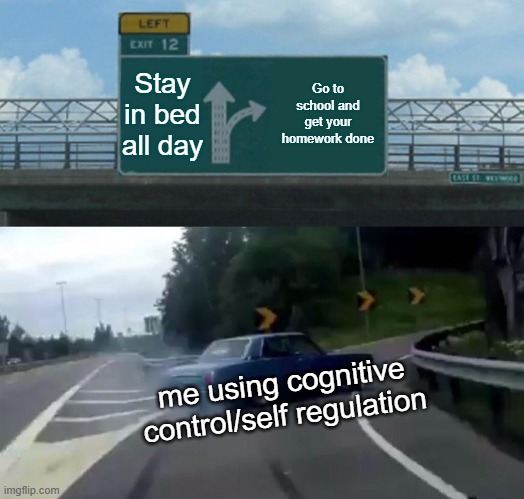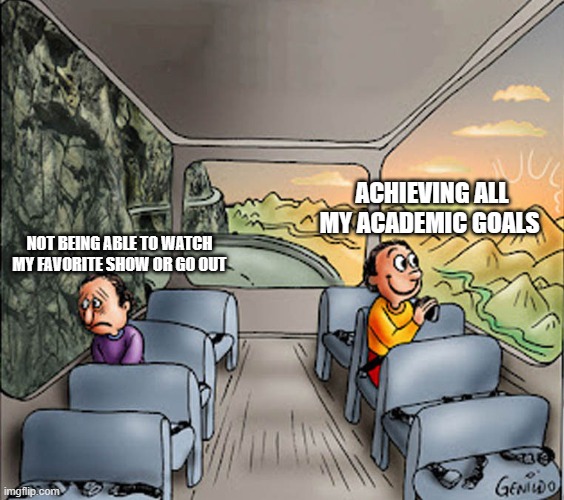By Chloe Smith
Introduction
There are days where it is hard to make yourself get out of bed, go to school, or complete an assignment, but these are tasks that need to be completed in order for success. Every student is responsible for their own success, and this includes having goals and doing things we may not want to do to reach those goals. Being a first-year college student can be intimidating in itself, and you may wake up one day and ask yourself, “Do I really want to go to class today?” You may enjoy lying in bed all day catching up on your favorite TV show, but you must control those thoughts and make the choice that will ultimately benefit you in the long run. By overriding these thoughts and still getting up to go to school to achieve your goals you are participating in the use of cognitive control and self-regulation.

Cognitive control and self-regulation? What is that?
Just by looking at the terms cognitive control and self-regulation you are probably asking yourself what this means. Cognitive control is a process involved in goal-directed behavior. Cognitive control is what you use when you have goals and the means you must take to achieve them (1). Cognitive control involves coding of problem-solving processes that require behaviors to be regulated in order to meet the goals that you have in your mind (2). For example, if the goal you have in your mind is to maintain good grades, study efficiently, and stay caught up on homework you will have to regulate your other thoughts of wanting to go out with friends or sit and binge watch a show. Self-regulation goes right into the same concept of cognitive control. Self-regulation is defined as the regulation of personal thinking and actions (3). This means you have to set goals for yourself, and you are the only one who can determine your learning outcomes (3). Both cognitive control and self-regulation are very important when it comes to studying and learning. Both concepts help to achieve your goals and they both involve you engaging in behavior that will push you towards meeting those goals. A student who uses self-regulation transforms their mental abilities into academic skills and achieves academic success (3).
Skills required in order to properly use cognitive control and self-regulation
If it is difficult telling your friends no when they ask if you want to go out, or not having self-control when it comes to wanting to do anything else other than study you may need to develop some other skills to successfully use cognitive control and self-regulation. You must be proactive when it comes to achieving academic success. Here are some skills that will help you have an easier time studying and being a successful college student.
- Goal setting (3)
- Self-monitoring (3)
- Time management (3)
- Regulation of personal efforts towards learning goal fulfilment (3)
Along with those skills that are required for your goals of studying, self-regulation learning has four stages; Task definition, goal and plan setting, implementation of tactics, and implementation of metacognition (3) To put those steps into easier words this means that you must first set your tasks/goals and determine what strategies you are going to use along with a schedule. Then you must implement your plan by watching how well you are doing to reach your goal. So, when it comes to studying it would be good to set a goal that you will not go out or be distracted by other activities until you have finished all your assignments and studied that day. You can set different goals of how many hours a day you want to study. Then you would have a schedule of when you complete these goals. After you start this, you need to watch your progress of how well you are working towards your goal and if you notice you aren’t doing so well, things are going to need changed to put your goals first and everything else after that.

Reasons why you should use cognitive control/self-regulation
You may be thinking to yourself, “I can still manage my studying and go out with friends.” Or “It’s easy to watch TV for a bit and then focus on schoolwork.” My response to this is that if you try to go out with friends when you know you have studying or assignments to get done two things could happen. A.) You are going to rush through your homework or not study as in depth because you are hurrying to do something else, or B.) You are going to end up staying out much later than anticipated and risk missing a deadline or not getting any studying done at all. This can also happen with things like watching shows before putting school first, one episode can turn into ten fast and before you know it its time for bed, and you again risk rushing through studying or assignments because you wasted your time on other things. When you have the ability to not give into the temptation of other things around you and instead focus on your studies you are successfully using cognitive control (4). If you put your studies first and get your assignments done, you can put much more effort into your schooling because you are not distracted by other stimuli. Cognitive control also helps in developing other cognitive abilities like working memory, prospective memory, and metacognition (4). By developing and using self-regulation your critical thinking skills will also become higher allowing you to be more successful in college (5). As stated earlier, self-regulation means you are responsible for your own learning and when you learn independently and have good self-regulation, it triggers curiosity and learning challenges which in return strengthens critical thinking (5).
Conclusion
Being a new college student can be confusing and overwhelming, when it comes to studying effectively and learning material it can be hard to know where to start. A great way to start is with goals of what you want to achieve academically. Things must be pushed to the side sometimes if we really want those goals to succeed. Distractions are all around us and it is important to get those distractions out of your head and to make sure you are in a distraction-free environment. The TV, phone, and going out will all have to wait if you want your college goals to succeed. Using cognitive control and self-regulation your studying sessions will be much more efficient and your best effort will be going into your assignments and tests. Do everything you can to make it easier to achieve your academic goals, and there are always other opportunities to have fun… after you are done studying.
References
(1) Friedman, N. P., & Robbins, T. W. (2021). The role of prefrontal cortex in cognitive control and executive function. Neuropsychopharmacology, 47(1), 72–89. https://doi.org/10.1038/s41386-021-01132-0
(2) Chevalier, N., Lipina, S., Scerif, G., & Segretin, M. S. (2022). Special issue on development of self‐regulation, cognitive control, and executive function, part II: Editorial note. Developmental Science, 25(6). https://doi.org/10.1111/desc.13326
(3) Sinkkonen, M., & Tapani, A. (2024). Review of the concept “self-regulated learning”: Defined and used in different educational contexts. International Journal on Social and Education Sciences, 6(1), 130–151. https://doi.org/10.46328/ijonses.640
(4) Frick, A., & Chevalier, N. (2022). A first theoretical model of self-directed Cognitive Control Development. Journal of Cognition and Development, 24(2), 191–204. https://doi.org/10.1080/15248372.2022.2160720
(5) Nizaruddin, K. (2023). How are critical thinking skills related to students’ self-regulation and independent learning? Pegem Journal of Education and Instruction, 13(4). https://doi.org/10.47750/pegegog.13.04.10
Hi Chloe! I really enjoyed your blog post about the will of doing your homework! There are definitely times in college my first-year and even now where I want to put off assignments because they are not due for a little bit, but I feel the way you talked about goal setting, self-monitoring, time management, and regulation of personal efforts towards learning goal fulfilment for ways to use cognitive control and self-regulation really had me reflect that these are ways for me to be productive. I will certainly try to use these strategies to help me not be such a procrastinator and have better self-regulation on my studies.